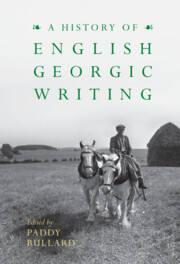Book contents
- A History of English Georgic Writing
- A History of English Georgic Writing
- Copyright page
- Contents
- Contributors
- A Note on National Designations
- Abbreviations
- Introduction
- Part I Turnings
- Part II Times
- Chapter 5 Jacobean Georgic
- Chapter 6 ‘Varieties too Regular for Chance’
- Chapter 7 Enlightenment, Improvement and Experimentation
- Chapter 8 Georgic, Romanticism and Complaint
- Chapter 9 Rural Labour in an Age of Industry
- Chapter 10 Labour Isn’t Working
- Chapter 11 Twentieth-Century Georgic
- Chapter 12 Rags and Tatters
- Part III Territories
- Bibliography
- Index
Chapter 8 - Georgic, Romanticism and Complaint
John Clare and His Contemporaries
from Part II - Times
Published online by Cambridge University Press: 01 December 2022
- A History of English Georgic Writing
- A History of English Georgic Writing
- Copyright page
- Contents
- Contributors
- A Note on National Designations
- Abbreviations
- Introduction
- Part I Turnings
- Part II Times
- Chapter 5 Jacobean Georgic
- Chapter 6 ‘Varieties too Regular for Chance’
- Chapter 7 Enlightenment, Improvement and Experimentation
- Chapter 8 Georgic, Romanticism and Complaint
- Chapter 9 Rural Labour in an Age of Industry
- Chapter 10 Labour Isn’t Working
- Chapter 11 Twentieth-Century Georgic
- Chapter 12 Rags and Tatters
- Part III Territories
- Bibliography
- Index
Summary
The georgic in English is often said to have receded after the 1770s. This chapter argues that in the Romantic period the georgic does not disappear, but assumes a new form: the ‘rural complaint’, a lyrical lamentation on social conditions in the countryside. Georgics in a more conventional didactic and descriptive form continued to be written, such as Robert Bloomfield’s The Farmer’s Boy and James Grahame’s British Georgics, but these incorporated rural complaint interludes. At the same time, standalone rural complaint poems, following Oliver Goldsmith’s The Deserted Village, consistently alluded to, and situated themselves within, a classical and neoclassical georgic tradition. Understanding the Romantic rural complaint as a form of georgic (rather than, or in addition to, pastoral) sheds light on the generic choices of poets such as Charlotte Smith, William Wordsworth and John Clare.
- Type
- Chapter
- Information
- A History of English Georgic Writing , pp. 177 - 196Publisher: Cambridge University PressPrint publication year: 2022
- 1
- Cited by

